
52 minute read
The Sleep Scientist
OF FEATURE
Sleep Scientist explains the mysteries of sleep and how to get better at it
Advertisement
Sophie Bostock is a sleep scientist – a passionate and knowledgeable advocate for the power of sleep and the positive impact that sleeping well can have on your career, relationships, and mental health. James Garner writes
Sophie Bostock (n97-99) is the OF you most want to meet if you are struggling with your sleep. The simple facts are that most of us will experience sleep problems at some point in our lives. “There’s a huge swathe of the population, more than 50 percent, that at one time or another have difficulties sleeping. Most don’t need a clinical solution but some trusted advice that few people learn in school. “There’s a gap in knowledge and sometimes in motivation – there’s a lot of education to do around sleep,” explains Bostock. And this educational role is largely what she does now. She describes herself as a Sleep Evangelist. This means sharing sleep science and advice across a diverse range of settings and mediums. It can be answering frequently asked topics on her blog, giving TED talks, delivering training courses and advice to organisations, or appearing on TV shows like ITV’s This Morning. Over the last year Bostock has worked with organisations such as Google, the Royal Marines and the Premier League, as well as countless individuals, to help promote the sleep and how to optimise it. “I feel incredibly lucky – I have a fascinating job. My role is helping people get the right amount of something they want, that makes them feel good, perform better, improves their health and is completely free.” Her career is a classic example of following your passion to where it leads and she implores young OFs not to discount the benefits of following such a route. “I didn’t have a clue what I wanted to do when I was at school. I started studying medicine at university, but I wasn’t sure I wanted to be a doctor. “I never had a career plan – and still don’t – but have always followed what I was interested in,” she says. “After three years studying medicine, I knew I didn’t want to spend my career working in hospitals. I opted for a one-year masters in entrepreneurship. It was really a stop gap, but it turned into this amazing oneyear introduction into business. It made me realise that business is not so mysterious and the idea of creating your own path came from that.”

After several years in consulting, Sophie completed a PhD in Health Psychology at University College London investigating why happiness protects against heart disease and how to improve wellbeing at work. “I set up a trial with two big companies to investigate how mindfulness meditation can impact sleep using the Headspace app. People would come back after six weeks of learning to meditate and say, well I’m not sure I’ve learned how to meditate but I’m sleeping much better and I’m feeling pretty good. “I realised there was a powerful relationship between sleeping, mental wellbeing and physical health.” Bostock spent five years working on Sleepio, Big Health’s award-winning digital sleep improvement programme, first as a research scientist and then as the UK Innovation Lead. It was during this time that Bostock realised how much she enjoyed giving talks, and delivering training, and so the move to being an independent Sleep Evangelist perhaps wasn’t so daunting. Turning to sleep technique, is it possible for human beings to survive on just a few hours sleep, such as the famous four hours a night that Margaret Thatcher decreed was enough? Bostock says most of us can survive for months or even years on just a few hours of sleep a night, but the impact of this sleep debt builds up over time. “If I talk to someone who is struggling to find time for sleep, I’ll always try and find out what it is that is most important in their life. “Deliberately cutting back on sleep is usually counterproductive. Kidding yourself that you can adapt to less sleep simply won’t work. What you are usually doing is adapting to performing at a lower – sleep deprived – level of performance. You find it harder to remember things, to focus, to empathise or to be creative. “New parents know this only too well. It is not that you cannot survive. It is just that you’re not on your “A” game. If you give yourself the gift of good sleep, then you are giving yourself the opportunity to be the best version of you, more of the time.” Over time, research shows that getting fewer than seven hours of sleep is linked to greater risks of ill health, such as infections, depression, anxiety, weight gain, diabetes, stroke and cognitive decline.
Advising Stacey Solomon on sleep strategies

If you are facing a sleep challenge, such as big deadline, or exam season, Bostock’s advice is that you will find it easier to cope if you are well rested before you start. “Sports people often use ‘sleep banking’, where you try and get extra rest for at least a week leading up to a big event.”
Losing sleep for a while isn’t necessarily harmful, Bostock adds, but the important thing is not to let poor sleep continue indefinitely. “There’s no evidence that parents have a lower life expectancy, despite all their broken nights of sleep,” she says. One piece of advice for new parents is to take it in turns. “It’s really important you try and look after each other as well as the baby. Couples who are both sleep deprived are more likely to argue, and less likely to be able to resolve those arguments amicably.” Mental health has a close relationship with sleep. “Sleep is intrinsically linked to our mental health. When you’re stressed, your brain’s response is to assume that you’re in danger, and so you don’t sleep as deeply. “There have been lots of complaints about that since the Covid-19 pandemic started, with people sleeping the same amount of time, but just not feeling refreshed.” If you are stressed, and let’s face it most of us have had higher stress level than normal over the last nine months, there are a few things you can do to get your sleep back on track, adds Bostock. “Make time to tackle your worries during the day – ideally several hours before bed.” Some people find it helpful to schedule daily ‘worry time’ in their diary. They use this time to write a list of what they are worried about, and then separate the list into those they can control, and those they can’t. “If you can’t influence or change it, then practice simply acknowledging it as a worry, and letting it go.” For the things that you can influence, get some plans in place. “Focus on one action a day that you can take that helps you to deal with things that are bothering you.” She also believes in mindfulness meditation. “There is strong evidence that it’s helpful for coping with stress, and it’s what got me interested in sleep. “But there is a hitch – the less sleep you’ve had, the harder you’ll find it to meditate.” If you’ve been living your day at 300mph, you need to put the brakes on gently, or your mind will struggle to switch off, says Bostock. “Try going for a short walk to wind down at the end of the day. If meditation is not for you, try reading a book, listening to music or having a warm bath or shower. Protect the last hour of the day for a gradual journey towards sleep.” “Parents know you can’t take an overactive toddler and put them to bed and expect them to go to sleep straight away. As adults, we tend to forget about this. “If you’re lying in bed getting frustrated that you can’t sleep, don’t panic. The harder you try and sleep, the more unlikely it becomes.” Bostock says if you’re awake for 15 or 20 minutes, get out of bed, and read a book until your eyelids start to feel heavy.
“Only then get back into bed. If you only get into bed when you’re feeling sleepy, sleep will almost certainly follow,” she says. Bostock says sleep is a skill, particularly for those who have lost touch with their natural sleep patterns. “It can take time and practice to re-train your sleep patterns. “When you do sleep well, and have a restorative sleep, everything the next day just gets easier. “The well slept brain is more rational and strategic, and your self-control is much better. In fact, there’s little that can’t be improved with a good night’s sleep.” I think we would all agree with that.
Bostock’s Sleep Tips
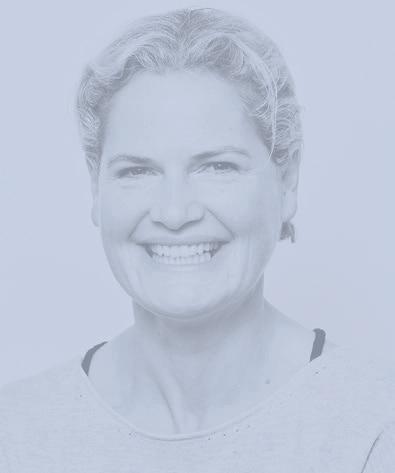
1. My personal favourite is waking up the same time of day every day including weekends – one thing you can do to get the body ready for sleep is to go to bed at the same time every day 2. Set an alarm on your phone to remind you to have an hour of wind down time, then switch off your phone 3. Enlist your partner or family to have some shared goals for sleep. It is quite hard to do something related with sleep without getting your household on board
FELSTED HEAD BOY AND GIRL REMAIN UPBEAT DESPITE CHALLENGING LAST TERM
Heads of school Annabel Hills (gn15-20) and Oliver Butler (fhc10-20) reflect on their truncated final year at Felsted and how lockdown affected their roles. Imogen Gander reports
Annabel Hills
Our last year at school was always going to be a rollercoaster. Preparing for university, working towards our final exams and taking part in a myriad of events. Although, it was cut short, I still have a bundle of memories that will last me a lifetime. The start of lockdown came with many uncertainties for the Upper Sixth, especially following the cancellation of exams. However, like many members of my year I managed to use this time productively. I made sure to exercise frequently, a bittersweet activity as the summer term is usually packed with sports fixtures, and I was sad to miss out on my final season as cricket captain. I also learnt many new recipes in anticipation of my move to university, something that I don’t think I would have had time for otherwise. Towards the end of lockdown, I managed to find a job in a hotel in which I experienced a different side of hospitality that incorporated new rules to protect staff and guests. I think that Felsted was superb in encouraging us to stay in contact with each other, and I think it is safe to say that everyone was thankful for Zoom and FaceTime that allowed some form of socialising. The Felsted 2.6 Challenge (see box opposite) was also a great way for students and teachers to communicate from home and allowed us to remain connected to the school whilst also raising money for our local Churches Homeless Emergency Support Scheme (CHESS) charity. As head girl, I was tasked with encouraging other pupils to take part in this challenge, and was amazed and impressed that we managed to raise £2,500, especially as I know that many students found it difficult to adapt to online learning and staying motivated due to the lack of routine that came with lockdown. Personally, I also used my time at home to help the community by volunteering as an NHS responder and assisting two of my elderly relatives with shopping and other tasks. Undeniably, every Felsted pupil looks forward to their final speech day and Leavers’ Ball, and it was devastating to find out that we wouldn’t be able to enjoy these events and celebrate everything that we have achieved as a year group.

I was looking forward to presenting my final speech on the last day of term, but believe that Felsted’s Virtual Speech Day was the best way to try and have some normality during these difficult times. I am grateful that the school is still trying to rearrange the Leavers’ Ball as I do think that it is something every Felstedian should have the honour of experiencing, although I appreciate how difficult this is with the regulations constantly changing. I have no regrets about my time at school, but I think that this whole experience has really taught me to make the most of the time that we have as we can’t predict the future. It is important to remember that lockdown, and the cancellation of exams, brought its own challenges for our year group. After the initial sense of relief, we were faced with uncertainty over how exams would be assessed, and the stress that this brought was compounded by knowing that we wouldn’t have the great sense of accomplishment that comes after a tough exam period. Fortunately, I was pleased with my results, and am excited to be heading to Exeter University to study Liberal Arts, majoring in International Relations and Politics. It is a slight change of plans as I had intended to go travelling and work during my gap year, but I hope that by completing a degree with employment experience and taking time out afterwards, I can still enjoy these things in the future. I am both optimistic and anxious about the world that will emerge after this pandemic. As we came out of lockdown, it was initially difficult to try to return to normal life, with masks, social distancing and other guidance carrying us further from the social norms that we were used to. However, as we become accustomed to these new rules, and scientific research keeps developing, I am optimistic that we will move forward beyond this pandemic whilst also being as safe as possible.

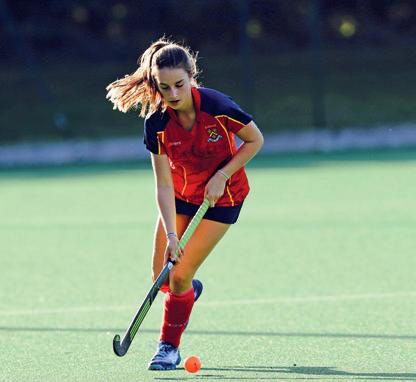
Oliver Butler
My final year at Felsted was no less enjoyable than all my years before. The unexpected and abrupt end to school was a shock, and it is a shame that we could not experience our final term together, but thankfully I don’t feel as though lockdown tainted any of my memories. It feels like a long time since I was at school, but fortunately the memories are as vivid as they have always been. The summer term this year had an element of unpredictability. I think this actually made me take advantage of my final weeks and months at school, and I tried to continue to make the most of everything, as I had done my whole time at Felsted. Had I known that school would have ended earlier than expected, I think I would have cherished my last year even more than I did, but I am glad that I remained active and connected. Along with Annabel and others, I took a lead role in promoting the Felsted 2.6 Challenge, which was a lot of fun, and coming into school to record our Speech Day speech was an unusual, but certainly memorable experience. The rest of my lockdown was productive too; whilst I didn’t take up any hobbies, I occupied my time by keeping fit, working on various projects around the house, reading and cooking. Even though I used lockdown well, there are certain things that I look back on and wish could have happened. As a keen rugby player, I wish the Roslyn Park sevens could have gone ahead – this was always a highlight for me, and of course the Leavers’ Ball is one that we hope can be recreated later. I would’ve loved to be able to experience the end of year house competitions, or to have had a final day at school, but the fact that we didn’t have them is all part of what’s happened in the last year, so we must come to accept that and move on. Surprisingly, I was even quite disappointed that our exams didn’t go ahead as I know that I, along with the rest of my year group, put so much effort into attaining the results that we wanted. I was pleased with my results but realise this was not the same for everyone.
The Felsted 2.6 Challenge Based on the number ‘26’ (the marathon distance), a number of challenges for all ages and abilities, such as run/swim/cycle 2.6k, bake 26 cakes, complete a 26 minute yoga session, or be creative and ‘design your own challenge’, were undertaken in aid of the charity CHESS. Fortunately, Covid-19 hasn’t changed my plans, as I was always intending on going to university, which is still great despite the restrictions. I do believe that graduating into a world after Covid-19 will make our generation’s future more challenging, but luckily everyone is in the same boat. I’m optimistic as there is still plenty of time for me to work out what line of work I want to go into once I graduate, but coronavirus has changed my perception of what my choices are and it has helped me broaden my horizons. Despite the uncertainty that we face over the next few years, I am positive about what the rest of my life will be like.


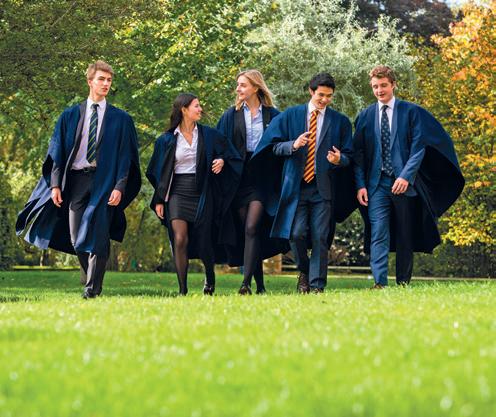
The ‘class of 2020’ in March
OF FEATURE
Generation games – The Browns
In this new series we take two related Old Felstedians who attended the school at different times and let them reflect on their time at Felsted and the impact it has had on their lives. Imogen Gander chats to Chair of Governors Rob Brown (fd74-84) and his daughter Alicia (fgn15-17)
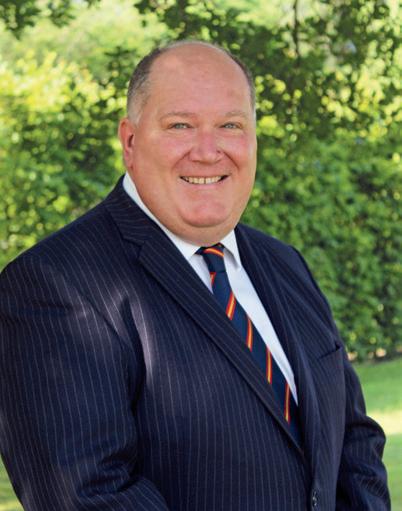
Rob

Felsted undoubtedly shaped the person that I have become and the life that I have led since. Despite being born in New Zealand and spending my childhood in Hong Kong, I went all the way through Felsted as a boarder. I subsequently met my wife at an OF ball as her father and brothers also went to the school. Looking back my experience at the school was very different to what it would be today, as there is so much broader attention and focus on the pastoral and holistic aspects of living at the school, although I can’t complain because Felsted served me well. I remember being shocked by the sheer scale of the school when I arrived. The vast playing fields seemed a world away from the tiny island of Hong Kong, and the students towered over me, although that might be because we accidentally pulled up to Elwyn’s instead of the prep school. Perhaps my awestruck younger self was too overwhelmed to do so at the time, but I wish that I had taken a deep, reassuring breath and lived more in the moment, seizing even more of the opportunities that Felsted afforded me. It’s a cliché but I didn’t appreciate the opportunities that going to Felsted provides you. I took for granted the abundance and breadth of experiences that I had during my time there.
Rob with fellow golfers in 1984.
Perhaps I should at the time have been more curious about my education and more diligent in my studies and that may have led me towards university, although I am grateful that Felsted helped me to get my first job straight out of school which became the launchpad for my career. I’ve now spent 36 years in the insurance sector, taking on a multitude of management and leadership roles, which have prepared me for my current positions as group chief executive of Charles Taylor and chair of governors at Felsted. I was given my first taste of leadership by the teacher who made the biggest impact on me. As housemaster of Mont’s, Nicholas Hinde was a supporting and encouraging figure whilst my family lived overseas. It was his decision to appoint me to head of house that made me realise leadership is both a privilege and a serious responsibility and commitment to others – a value and maxim that I have abided by ever since. I believe that this experience, and my time at Felsted as a whole, enabled me to become “rounded and grounded”. I learned to work backwards from the outcome that I want to achieve, always striving towards the end goal. Another focus of my life since leaving Felsted has been to create defining memories and trying to achieve this firstly with my family and friends but also in my work with my colleagues. My demanding workload has meant that I haven’t spent as much time with my loved ones as I would have liked, but I hope that they know how much I cherish the time that we do spend together – making the memories that have always been so important to me. I am pleased that my daughter, Alicia, was also able to go to Felsted, as it undoubtedly helped shape her into a confident, articulate and thoughtful person from whom I can now learn so much. As well as instilling in me an enduring desire to continue learning, being at Felsted allowed me to form lifelong friendships. I am so thrilled to still be close with those I went to school with – my best friend from Felsted was my best man, and I, his. I loved playing sports and the dedication of the coaching staff helped make my time at school as rewarding and enriching as it could be, encouraging us players to develop the leadership and teamwork skills that have carried me throughout my career. I took over as chair of governors at Felsted last year, having been a member of the board since 2014. I didn’t expect to be giving the 2020 Speech Day address to an empty Barbara Karan Auditorium, but this year’s challenges have allowed us to think creatively to find a way to ensure that Felsted continues to thrive and that students can flourish as safely as possible. As a father and former pupil, I have witnessed firsthand the resilience that Felsted develops in its students, and I hope that we can continue to foster the skills that will carry Felstedians towards future success.

Alicia

I had a far more unconventional route through Felsted than my father, as I left at the end of Year 2, only to return as a weekly boarder in Follyfield for sixth form. I am so glad that I made the decision to go back to Felsted, and I too believe that it is the opportunities that Felsted offers which make it such an incredible place to go to school. Like my dad I met friends that I still cherish, and with them I was able to celebrate winning the house shout in upper sixth, which is undoubtedly one of my favourite memories of my time at Felsted. I was nervous to return to Felsted, having come from a small all-girls secondary school, but my fears were quickly assuaged as I was welcomed with open arms, and I found that instead of being the scary experience I expected, boarding made this transition easier. Felsted’s scale was immediately less daunting as soon as I began to live there and thought of the site as home. My time at Felsted has helped to shape the decisions, and path, I have taken since. An incredible biology field trip to Bali that involved scuba diving and wildlife observation inspired me to begin an Earth and Ocean Science degree at Brighton University after my gap year. I am certain that I wouldn’t have chosen this path if it hadn’t been for that trip, as since then I have broadened my horizons and become far more environmentally conscious. I believe that I have combined what I have learned from my dad’s leadership style with Felsted’s encouragement to respect myself and others in a non-judgemental way, to educate those around me about conservation issues that are close to my heart. I try to provide others with knowledge to make their own decisions rather than pushing my beliefs on them, as through my time at school, I developed a strong sense of independence, and would hate to deprive others of this freedom of thought. As well as intellectual independence, Felsted, and my boarding experience, provided me with the self-reliance I needed to pursue an incredible gap year travelling through places such as South Africa, Thailand and Australia. Spending weeknights away from home, supported, especially during an upper sixth fraught with personal challenges, by Mrs Barrett and her team in Garnetts, was an important stepping stone to spending a whole year abroad and then moving to university. My family have commented more than once on the confidence that I have displayed since leaving school. I am eager to engage in debates and share my eagerness to learn with those around me. I second my dad’s desire to be able to speak to my pre-Felsted self and I’d urge her to make the most of being at school, to slow down and take in her surroundings without worrying about the future, because the time will fly by. I would have liked to have spent more than five years at Felsted, as I know that I would have taken up even more of the opportunities offered to me, but I am grateful that I was there long enough to learn how to respect myself and to define my own success. Belonging to the third generation of my family to go to Felsted has shown me that the lessons I have learned will carry me through university and into my future career. I look forward to seeing where the skills that I learnt at school will take me, and hope to be able to cherish the school memories I share with my father for many years to come.

OF FEATURE PHOTOGRAPHER CAPTURES LIFE IN LOCKDOWN
Professional photographer Tom Soper (b87-92) has compiled a book of images taken of his neighbours during national lockdown.

He wanted to try and capture the fantastic sense of community spirit through his lens. “Photography has always been used to record and remember important times and I felt that this was an opportunity to add to the local record. “I hoped that my photos, alongside the reflections of the residents photographed, would form a small, interesting archive of this incredibly unusual time,” added Soper. “One of the real positives to come out of the lockdown was the increased sense of community. Ironically, although I had hardly been out of the house, I felt like I knew my neighbours better than I did before the crisis began. My main impression was how very friendly everyone was who had their photo taken.” One family stood out for Soper. “I felt really sorry for one couple whose middle-aged son had a triple heart bypass just as lockdown started. They were really worried about him and his wife and children hadn’t been able to visit him in the hospital due to lockdown.” The project also pushed him in new creative ways. “I didn’t want all the photos to look the same, so I had to be inventive to ensure there was some variety. The project has also led to some other work with families commissioning me for shoots which was great.” Soper added he was hugely grateful to all those who agreed to be photographed. “Hopefully this collection of photos will be something they can

Tom and his family – son Sam using the remote release to take the shot
Tom Soper took more than 30 photographs of his neighbours on their doorsteps in Victoria Street, Bury St Edmunds, Suffolk during lockdown for his book Lockdown Doorstep Portraits in the early summer. look back on in easier times in the future.”
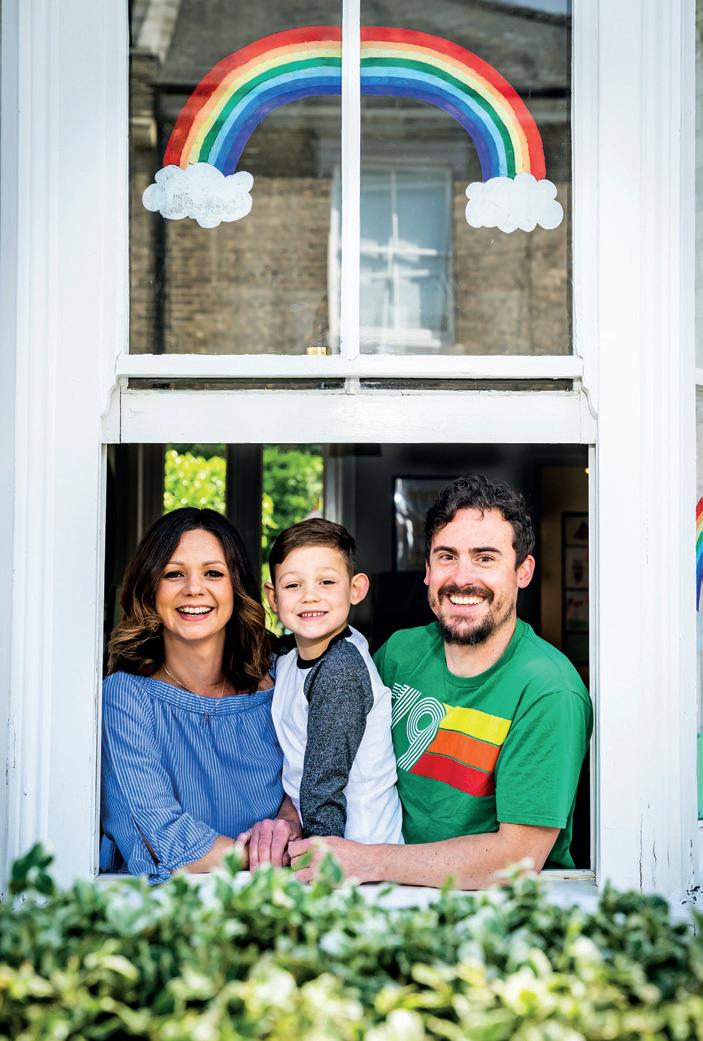
STAFF PROFILE MEGAHEY’S PASSION FOR WELLBEING LEAVES A LASTING LEGACY AT FELSTED
Felsted Common Room stalwart Karen Megahey has hung up her teaching cloak to retire to Dorset. Imogen Gander caught up with her to reflect on her 26 years’ teaching at the school
What inspired you to become a teacher and You were housemistress of Stocks's for six how did you end up at Felsted? years. How was that and did you enjoy the I have no idea why I became a teacher, but I felt experience? compelled to do it. After my PGCE, I began teaching It was so good – most of the girls were happy, which I at a comprehensive in Chelmsford. When my came to appreciate later during my wellbeing role. husband Chris (81-16) got a job at Felsted and my However, it was an incredibly exhausting job, as children started at the school, I began teaching there teenage girls needed far less sleep than I did. on a part-time basis in the late 1980s. Felsted was unique for writing my timetable around my childcare Who was a guiding influence for you in the arrangements, and after that, I was too spoilt to ever Common Room at school? move anywhere else. I had many great friends in the Common Room, such What have been the highlights of your 26-year career at Felsted and how has the school changed? as Béatrice Lemoine-Chicoine and Jenny Burrett. I would have to single out Moira Grierson Rickford, and her husband Alastair, who I worked for in Garnetts. This was my first experience of a girls’ I started full-time in 1994, and really wanted to be a house and their influence was pivotal in my housemistress and although there were only a few becoming an housemistress. girls at the school, I was thrilled to be able to lead Stocks’s for six years. My last three years at Felsted Felsted has placed more importance on were the most fulfilling and happy, though, as I was student wellbeing recently, your role was able to introduce the Wellbeing Centre (later to be concerned with this. Please tell us more and named after her) and begin onsite counselling. why you think it's important for students in The school has focused more on its duty of care 2020 towards pupils, but the biggest change was when the As soon as I started teaching I saw that how a pupil lower school accepted girls in 1994. Before this time, was feeling affected their classroom performance. old-fashioned and paternalistic attitudes ran When I first took over as housemistress for Stocks’s, rampant. The introduction of female students helped some girls had serious mental health issues, and I to improve the school because they certainly found there was nothing to help them. I researched challenged the boys, a real change from the obscurity and took them to their appointments and was and lack of recognition that surrounded the sixth impressed by how much of a difference counselling form girls. It wasn’t all smooth sailing as many made, so decided to organise training for members of the common room were surprised that housemasters and housemistresses about possible young girls could be just as naughty as their male student mental health problems. counterparts. It’s so important that students are conscious of their How was it to experience being a teacher and parent at Felsted at mental health and that the stigma around this topic is broken down – schools are great places in which to do this. the same time? A struggling pupil wouldn't think I didn’t really think anything twice about asking for maths of it when my children were help, so why shouldn’t they treat at the prep school, but I was housemistress when my son their own wellbeing in the same way? Steven came to the senior school and it was strange having children in the boarding house too. He took it in his stride, but my daughter Sammy kept her distance in another house. A downside of teaching at my children’s school was that they never told me any gossip, although the girls in the boarding house Karen with her two children Sammy and compensated for this. Steven in 1989 Jenny Burrett with Karen Megahey in 1995
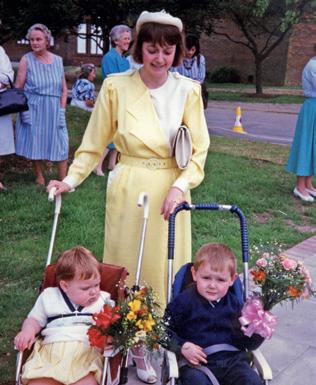

What role does "Wellbeing" have in a modern education establishment and what if anything could Felsted be doing better? It would be good for Felsted to expand the peer counselling programme and take it into other schools to spread expertise – I really enjoyed interacting with students whilst training them. I also think that having a specific space, like the Wellbeing Centre, shows how important this topic is to the school. My year nine classes loved having PSHE lessons in there as it made this a unique subject, and I didn’t even mind when the Windsor’s boys used the centre as a shortcut as it normalised its place within the school.
You've retired to Sherborne, Dorset... why there? What are you looking forward to doing most? I’ve always wanted to retire to the West Country and my husband wanted to go somewhere with a nice landscape. Sherborne is a lovely place with lots of shops, restaurants and societies. I am currently doing some part-time counselling, mostly by Zoom or telephone, but I would love my own room in which to work.
What will you least miss about school life? What will you miss most about Felsted? I certainly won’t miss waking up early in the morning – it’s nice to lie in and start the day slowly. However, I will miss the contact with young people and my friends, especially as I know that how they’re working at the moment is different to normal. It has been a real privilege to teach and counsel at Felsted. My whole family has taught there and I couldn’t have wished for a better career.
n As The Old Felstedian was going to print, we heard the very sad news that Karen's husband and former Felsted teacher Chris Megahey died peacefully at home. An obituary will appear in next year's magazine.

Allen retires after 40 years teaching Classics
by Imogen Gander
What or who inspired you to become a teacher and how did you end up at Felsted? It was luck really. I had just left school when my uncle rang one evening in urgent need of a Latin teacher and I suddenly found myself teaching his year eight scholarship class. Whilst at Oxford I was invited back to work each summer and found teaching so fun that I put aside my plans to convert to law, deciding that this was the career for me. My first encounter with Felsted came whilst covering a sabbatical term. I was staying with a friend in the village when a position as a classics teacher at the prep school came up. I began the next term on a two-term contract and left nearly 15 years later. During my time at Felsted, I was also appointed registrar and moved across the road to be head of classics at the senior school. I certainly had a lot to balance.
Who was a guiding influence for you in the Common Room at school? I worked with some fantastic people and couldn’t have hoped for a more cohesive or supportive group of colleagues in the classics department. My love of sport and umpiring allowed me to interact with some exceptional coaches and savour Felsted life outside the classroom. Both Frances Marshall and Nick Spring were great friends with whom I still have frequent conversations. That’s one of the strengths of Felsted – the collegiality that comes from maintaining good relationships with colleagues.
You taught classics – why do you love this subject and why is it relevant for today’s world? Why is it valuable for students? Classics is the root of our modern world in this country, whether it be in language, politics, architecture or law, classics provides the basis of our existence whilst also giving us the opportunity to look beyond ourselves at civilisation. I agree with Thucydides that history is a possession for all time, and the fact that today’s world is in some ways a replication of the past – modern presidential demagoguery has prototypes in both Rome and Athens – proves that we are slow to learn from our mistakes, making the study of classics all the more vital.
You were famous for your trips... tell us about your favourite and why? Despite the cliché, it’s fair to say that every trip has been a favourite – over my 40 year teaching career, I have taken over 50 sports and classics groups abroad. I have loved the classics trips, although they were incredibly hard work to run and organise. It doesn’t even get easier each time as the amount of paperwork required only increases. If I had to choose, I’d say that Rome was my favourite destination, as after 10 visits, my familiarity with the city made organisation fairly straight forward, although I always discovered new things to do. What will you be doing now you've retired? I had planned to travel, but as lockdown has postponed that, my focus has been on maintaining my Italian learning streak on Duolingo. I am certainly going to carry on umpiring both cricket and hockey whenever I can, whilst also continuing to work with the PGCE programme at Cambridge.


What will you miss the most about the school now you've left? The pupils and the joy of being in a classroom. I loved the sense of community provided by Chapel and other activities and I think I’m unusual, as I will miss being on duty in Garnetts.
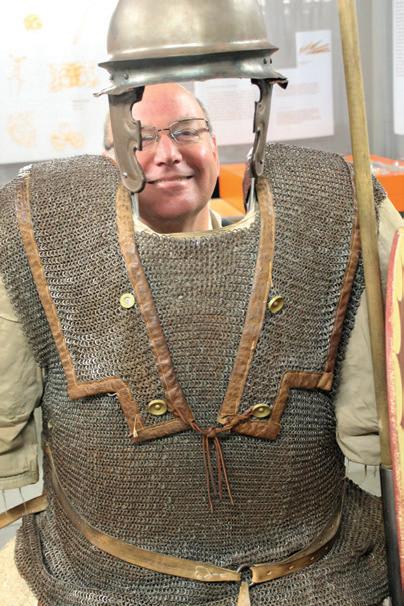
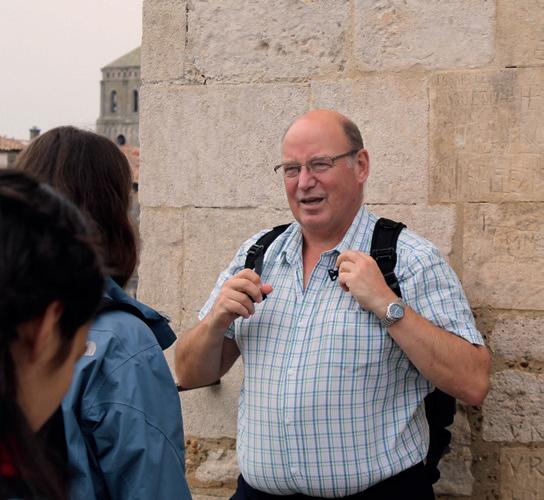
OBITUARIES
Cockett – a true Felsted legend passes aged 92
by James Garner
John Ashley Cockett was born on 23 December 1927 and served as a teacher at Felsted School from 1951 to 1989, the better part of 38 years.
As master-in-charge of cricket at Felsted, he oversaw the development of some truly fabulous OF cricketers, including of course England players Derek Pringle and John Stephenson. He was also instrumental in the Felsted Robins taking part in The Cricketer Cup competition. He was married to Heather and they had three children, Anthony, Gill and Robin.


Above: Housemaster of In an interview with the OF Deacon’s, 1961 Magazine in 2014 he was really very grateful of the life he had lived Right: John in 1975 and his long association with the Below: Attending the Robins’ school. “Yes, I’ve had a marvellous 50th Anniversary Dinner in life, which I’ve shared with lots of 2017. terrific people. They really were just very good years,” he added. His lasting impression on many OFs cannot be underestimated. As a person he was understated, To begin with he was unassuming, grateful and charming supposed to join the in equal measure, but with a steely school as master in edge and a mischievous twinkle in charge of hockey, which his eye. given that he was shortly to become a double He joined Felsted in 1951 after Olympian in the sport, graduating from Cambridge seemed a logical University during Henry Reekie’s decision. However, on reign as headmaster. “Things were so different back arrival at Felsted the offer was withdrawn, so as not then” he told the OF Magazine before adding wryly to offend the incumbent master in charge, and “even amateurish.” Cockett was asked to run cricket instead. Without formal teaching qualifications, he was Although he was undoubtedly a good cricketer, he asked to teach all manner of subjects when he won a blue in cricket at Cambridge University and started, including Divinity, Biology and Geography. scored a first-class century against Sussex at Given he studied Science at Cambridge University, Worthing, he was an even finer hockey player. which he explained was a “mix of Maths, Physics and Geology,” Divinity proved quite a stretch. He participated in two Summer Olympics for Great Britain, the first was in 1952 in Helsinki, where the In 1960 he was appointed housemaster of Deacon’s, team claimed a bronze medal, by defeating Pakistan a post he held for 20 years. Initially, it was a “waiting 2-1, the second followed four years later, when John house” serving to accommodate the overspill of captained the side in the 1956 games in Melbourne. other established houses but in 1964 it became a full As well as hockey, Cockett played cricket for many house. years for Buckinghamshire and represented the He felt that housemasters today have a tough life Minor Counties against the Australian touring side, with emails flying around. “Everything is so although he didn’t trouble the scorers in either immediate. That’s the trouble these days, people innings. react and don’t have time to think things through.” He recalled that the match was played at Stoke on a But Cockett wasn’t only a housemaster, he was also a dreadful wicket that was described by Lyndsay Habit natural coach at cricket or hockey. as nothing better than “a cabbage patch”.

TRIBUTE TO JOHN COCKETT
by Derek Pringle (e74-77)
I’m sure there are hundreds of Felstedians grateful to John Cockett for their proficiency in Mathematics. But they are outnumbered by the cricket and hockey players from the school who benefited even more from his sure, guiding hand. For them there will only ever be one master in charge – JAC. His running of the First XIs in those two sports, over generations of school-goers, was the personification of duty and one he discharged with enthusiasm and elan. If he tired of it, it never showed despite his dodgy hips and I for one can vouch for the enthusiasm with which we all looked forward to afternoon practice. My view is an unapologetically glossy one as I never felt the wrath of JAC the housemaster or had a forelock tugged after flunking a maths test (I was in another set). I did, though, experience the double ignominy of being struck for six over School House, by Essex’s Keith Pont, and then being told by JAC to go and look for the ball. It was a salutary lesson which I carried into my professional career as a cricketer – don’t bowl it in the slogger’s arc. His partnership with Gordon Barker, Felsted’s cricket coach in the 1970s and 80s, was one of those perfect couplings, especially when it came to shaping the minds of eager, young players. They made playing fun but focused and while Barks used to stress that winning was by far the best outcome, JAC was there to put a wider perspective on it so the pursuit of victory did not become all-consuming. Still, we managed to despatch most opponents who came wielding sticks or bats. It has become something of a cliché, which unfortunately devalues the sentiment, for people to recall the teachers whose advice, deeds and encouragement at school helped them navigate later life. If there were ‘nuggets’ dispensed by John I cannot recall them. What I do know, is that after 50 years of playing cricket and covering it as a journalist my time in the Felsted XI was the greatest fun of all – that and playing for Essex. As the man in charge John Cockett must take much of the credit for that. It is the human condition to believe that golden eras only ever exist outside the present one, but Felsted will be truly blessed if they ever see his like again.
Famous wildlife photographer dies aged 82
Peter Hill Beard (g56-57), was born in Manhattan, New York on 22 January, 1938.
Beard was an ESU Scholar spending a year at Felsted in Follyfield where he was a head prefect and learnt to box. After Felsted, he returned to the United States with a place at Yale University where he majored in Art History. Beard was famous both for his hedonistic presence in the New York party scene and his serious photographic and artistic work. His work from Hog Ranch, a 45-acre property in Kenya he purchased after falling in love with Africa, rose to fame during the ’60s and ’70s. He published his first book The End of the Game in 1965 examining big game elephant poachers who changed the face of Africa, featuring beautiful but heart-rending images that laid bare the fate of thousands of starving elephants, rhinos and hippos in Tsavo national Park in Kenya. His photographs of Africa, African animals and the accompanying journals have been widely published since then. With his film-star looks and party lifestyle, Beard collaborated with many legendary artists including Francis Bacon, Karen Blixen, Truman Capote, Richard Lindner and Salvador Dali. As well as African wildlife, he also photographed well-known celebrities, such as Mick Jagger, Jackie Kennedy, Pablo Picasso and Andy Warhol. Beard had brief marriages to socialite Minnie Cushing and fashion model Cheryl Tiegs, before marrying his wife Nejma Khanum in 1986. A few years later the couple welcomed their daughter Zara, for whom his book Zara’s Tales was written. It was recently reported that he had dementia. On 31 March, 2020 he went missing from the family home and was found dead in a nearby wooded area in Long Island almost three weeks after he disappeared. In a statement his family said: “Peter was an extraordinary man who led an exceptional life. He lived life to the fullest; he squeezed every drop out of every day... He died where he lived: in nature.”

Felsted’s first female student
Anne Wilson (née Telfer), the first girl to attend Felsted between 1940-41, has died. She was the daughter of Rev Andrew Cecil Telfer, former headmaster at Felsted prep school (33-45). Wilson joined the prep school when it was evacuated during WWII to Canon Ffrome Court in Herefordshire in 1940, along with her sister Mary Smalman-Smith (née Telfer, f43-46). Wilson’s first husband was Edward Lys Bentley Turner (c44-49) who was head of school and they had two children together, Anna and Jonathan (c72-77). Turner sadly passed away in 1976 and Anne went on to marry Charles Wilson. She died at home in Wiltshire on 20 June.

Stage, television and film actor dies
Actor Philip Latham (fe39-47) sadly died on 20 June at the age of 91. Latham was at the height of his television fame in the 1970s when playing Plantagenet Palliser in one of the most popular TV dramas The Pallisers, based on Anthony Trollope’s novels about a Victorian arranged marriage. Many will recognise Latham from Doctor Who’s 20th-anniversary special The Five Doctors when he appeared as the fourth incarnation of Borusa, the president of the Time Lords whose wish for immortality sees him turn to evil. He also played Klove in the 1965 horror film Dracula: Prince of Darkness alongside Sir Christopher Lee. Charles Philip Latham was born on 17 January 1929 in Leigh-on-Sea, Essex. At Felsted, Latham was a prefect, member of the Andrew Society, acted on the stage, and played cricket, hockey, rugby and tennis. His identical twin, William John Latham (fe39-47) and older brother Arthur Barrow (Barry) Latham (e39-44) were also in Elwyn’s and keen sportsmen. Latham completed National Service in the Royal Artillery after leaving Felsted. He graduated from the Royal Academy of Dramatic Arts in 1951 and went into repertory theatre in Farnham, Surrey. His West End debut came as the Dook in the Alex Coppell play The Gazebo at the Savoy Theatre in 1960. In his early career he appeared on TV in BBC children’s programmes, in parts such as Nicodemus in Jesus of Nazareth, before taking on roles in peak-time dramas. Latham married Eve Pitt-Payne, who died in 2010. He is survived by their two children, Andrew (e78-83) and Amanda.
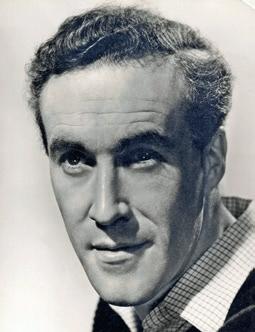
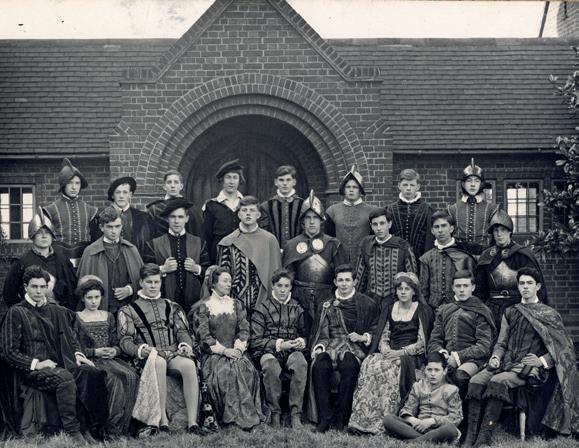
OBITUARIES VAL JANE CHATER, NÉE MYSON
by Caroline Cecil (m71-73)
Val Myson (m71-73) was one of Felsted’s second intake of girls. Her star shone. She was beautiful, smart and kind. Her laugh was distinctive – there was a pause then an eruption of giggles. It was no surprise that she made a big impression at the school including in Follyfield, the boys’ house she was allocated to, as well as at the Manor House. At the OF dinner in March this year, which marked the 50th anniversary of girls at Felsted, one of the highlights was seeing the photographs of the play Black Comedy performed in 1971 with Myson in the cast. After school, she went to the modelling agency Lucy Clayton and was chosen to model for the hairdresser Vidal Sassoon on the gameshow The Generation Game. She married Ian Chater (b67-72) in 1975 and taught art and geography at Felsted prep school from 1978 to 1982 while living in Little Dunmow. She and Ian rebuilt Kyson Hoo in Woodbridge overlooking the River Deben, which was to be home to their five children: Sam, Clare, Charles, Bella and George. She was so welcoming that many considered the house their second home and one of the children’s friends stayed for almost a year thinking he would go unnoticed. Myson became a successful healer, focusing on a range of therapies and travelling widely to understand the religions of the world. She died of cancer in September at the age of 65.
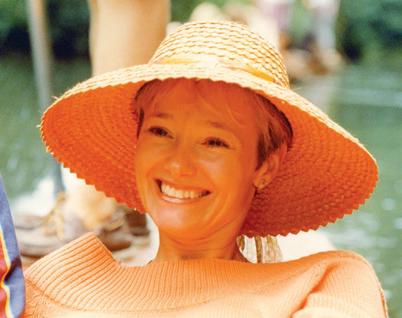
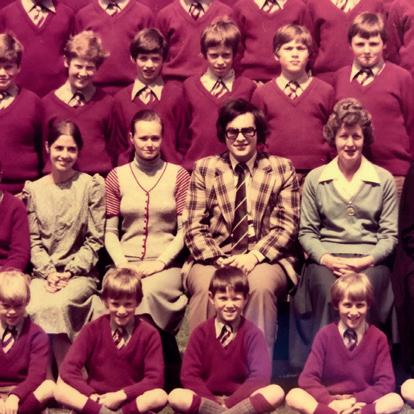
Leading computer expert has died
Geoffrey David Ellis (g50-55) died on 2 October 2019 at the age of 82. He won a scholarship to Felsted from Westcliff High School for boys and was head prefect and a sergeant in the Combined Cadet Force. Ellis completed National Service in the Royal Artillery after Felsted and was subsequently offered officer training but chose to enrol at Nottingham University to follow his interest in Theology. He then achieved a Postgraduate Certificate in Industrial Management at Strathclyde University. Ellis was described by his sister as “a cross between a member of Bletchley Park and Q from James Bond”. He started his career at a cement making factory in Dartford where he was responsible for maintaining its IT systems. He later became a consultant in the technology industry, wrote a book titled Mashinations and was a member of the Chartered Institute for IT. We sadly report the following deaths notified to us in 2020 ADIE, Anthony Granville (g38-41) ALEXANDER, Graham Hugh (e40-45) ALSTON, Michael John (b38-42) BAKER, John Harold (fg47-54) BALL, Group Captain Benjamin Wakely OBE (b53-57) BARGATE, William Nicholas (dc14-16) BEARD, Peter Hill (g56-57) BEHARRELL, John Colin (fe33-40) BING, Peter John OBE (d40-43) BOUSTRED, Richard Ernest (e37-41) BOWEN, David James (fc71-81) CARDER, John Reginald (fe35-43) CHATER (née Myson), Valerie Jane (m71-73) CHETWOOD, Stephen (a65-70) DEW, Lawrence Alan Russell (fd40-47) EASTWOOD, Martin Eric (fg57-65) ELLIS, Geoffrey David (g50-55) ESCOLME, Nigel Irving (b51-55) FOX, Ian Shoolbred (fg43-50) HADLEY, Squadron Leader Trevor George (fa43-51) HEATHCOTE, Anthony Kilner (e45-48) HYDE PARKER, Sophie Antonia (g06-09) HYDER, Henry Richard McKenzie (b42-47) JONES, Roger Cardain (g53-55) LATHAM, Charles Philip (fe39-47) LIDSTONE, Derek James (b55-59) LINFOOT, John Maurice Higham (fg38-46) LOVEDAY, Anthony Hubert (e45-49) MAHNE, Claus Peter (d46-49) MCVIE, Alexander (d50-54) MILLER, Nicholas John Scott (fa54-62) MOFFATT, Stephen Robin (d60-64) NEALE, Bishop John Robert Geoffrey (d40-44) PRICE, Malcolm Barry George (c49-54) REDMOND-LYON, Jonathan Hugh (c47-51) RIDLEY, Christopher William (fe42-50) ROBSON, Patrick Tom (a49-54) SMITH, Peter Morris (g61-65) SPOUSE, William Reynolds (fe48-56) SUDBURY, Geoffrey Walden (f35-38) WILSON (née Telfer), Anne (f40-41) WILSON, Warwick Arthur Vernon (h65-66) WORDSWORTH, Revd Jeremy Nathaniel (eg44-48) [staff 59-63] WYLIE, Ian Richmond (b38-41)
Former common room
COCKETT, John Ashley (51-89) GREGORY, Shirley (Prep School 58-59) MEGAHEY, Chris (81-16) RAWES, Dr James Charteris Lea (76-79) SPOONER, Allan (91-15) Please visit felsted.org/ofs/obituaries for more information.
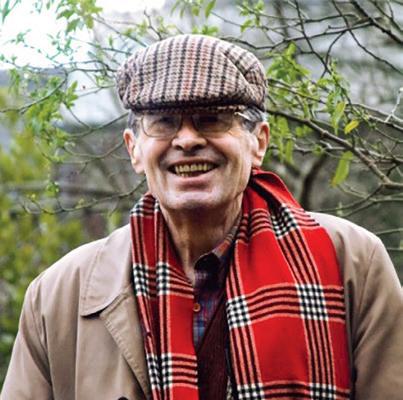

Golf Society review
by Stuart Mott (h69-74), president of the Old Felstedian Golf Society
Unsurprisingly this was a year in which little happened on the society golf front. None of the major team events took place and we were only able to complete four fixtures. Just prior to the first lockdown in early March we were fortunate to be able to provide 20 OFGS members and guests with a great day out at Aldeburgh, Suffolk. The weather was cold but dry and the course and catering were in fine order. OFGS captain Phil Graham retained the scratch trophy with a great score of 31 points on a countback from Tim Hedin. Hedin won the handicap trophy with a fine 36 points with Chris Pugh in second place. The guest prize was won by James Smith with 36 points. OFs present were Messrs Church, Doe, Graham, Griggs, Hedin, Meyer, Mott, Olley, Palmer, Phillips, Platts, Pugh, Salmon, Tudor and Wilkes. It was good to see Ollie Salmon making his society debut. The second event was not until 9 September and was a friendly match against Brentwood at Thorndon Park, Essex. The society was represented by match manager Chris Olley and Messrs Church, Freeman, Graham, Mott, Pugh, Palmer and debutant Benedict Gibbon. The result was a 3-1 loss with the Church/Graham combo providing our only point. The day concluded with an excellent curry in Brentwood. Like many other things planned for 2020, the Robins were forced to cancel and postpone all their fixtures planned for the season.
OFGS Hintlesham Match
Left to right: Chris Pugh, Peter Burleigh, Dick Tunbridge, Dudley Simpson, Ted Noble, Kevin Palmer, Mick Burleigh, Cosmo Pain, Steve Church, Will McMillan
Howard Machin kindly organised the autumn meeting at Beaconsfield Golf Club, Hertfordshire on 22 September. The event was played in glorious sunshine. Tom Simpson retained the trophy with 32 points on countback from Chris Olley. The attendees were Messrs Machin, McCrea, Olley, Pain, D Simpson, T Simpson and Weatherill. The final event of the year was on 28 September at Hintlesham Hall, organised by Dudley Simpson, our tireless fixture co-ordinator. The weather was fine and dry, the course was in good condition and there were some extremely good scores. Kevin Palmer was victorious with 39 points on a countback from Steve Church, Chris Pugh got 38 points and Cosmo Pain 37 points. Other attendees were Messrs M Burleigh, P Burleigh, McMillan, Noble, Simpson and Tunbridge. An unusual year, hopefully never to be repeated. I wish all OF golfers the best of health and look forward to a more action-packed schedule in 2021. Our fixtures are extremely enjoyable and if you play golf and would like to participate please get

MALINS MAKES ENGLAND RUGBY DEBUT
OF Max Malins (fhc02-15) made his England rugby international debut in the inaugural Autumn Nations Cup against Georgia at Twickenham on 15 November. Malins is the first Felstedian to play rugby for the full England senior side having also played at England U18 and U20 level. He follows in the footsteps of Rory Hutchinson (fh07-12), who has played three times for Scotland at the senior level too. He said of his England debut: “A massive thank you to everyone at Felsted School who helped a boy’s dream come true.” Malins is currently on loan to the Bristol Bears from Saracens and is having a great 2020 season at the Bears, helping them to secure a European title after scoring a try during the Challenge Cup final.

Felsted Robins enjoy 2020 games
by Ed Hutley (fd97-06) Felsted Robins cricket club secretary
in touch via ofs@felsted.org. The Cricketer Cup first round against Shrewsbury Saracens and fixtures against the school and MCC were cancelled. The Robins’ postponed fixtures were played in August and in an unusual first the club were the first side to play or train on The Front in 2020. Fixtures were shortened to 20 overs a side and this proved to be a winning formula amongst players and supporters. Robins’ week commenced with an emphatic 67run victory against High Roding cricket club and secured wins against Stebbing and Ploughboys.
Jack Hebron and Luke Chapman were the stand-out performers, each recording two unbeaten scores over 50. Another worthy mention is Charlie DouglasHughes, who rolled back the years with a direct hit from the boundary for a run out. Sunday fixtures were also played against Refreshers and away at The Mount, which were enjoyable competitive matches. The club would like to thank all players, officials, supporters and match managers for their support this year. It has been a difficult year for many, but in the few summer weeks when cricket was possible, the Robins showed tremendous spirit. The Cricketer Cup draw for the 2021 season has just been completed with the Robins being pitched away against Old Cranleighans on Sunday 13 June.

OF SPORT PROFILE
Earl’s dream of pro golf grows on the other side of the Atlantic
Rebecca Earl (fbn09-18) is a prodigious golf talent who is honing her skills in the United States at Wofford College. Here she tells James Garner how she is finding it
How's life at Wofford College in South Carolina? Are you back playing golf and studying? Did you have a coronavirus lockdown over there? It’s been strange, we have a mix of online, hybrid classes and in person classes. We are socially distanced in classes and wear masks always around campus unless we’re with our roommates. It’s been very busy since being back; we have a lot of class work to do and a full practice schedule including workouts four times a week. When I arrived back we just had to be tested but didn’t have to quarantine. There aren’t really any restrictions in South Carolina so I try to not go off campus too much.
How's this season's golf going? I guess it's been different and has that made life a bit tricky? Our golf season was actually cancelled this semester but we’ve been allowed to have our home tournament near the end of October and had an individual tournament at the start of November. It’s definitely been hard having to get to practice but our home course is 10 minutes away, so we are able to go to practice there. We’ve also had a new indoor golf facility built on campus this year with simulators, nets and a putting green so it’s been really good to practice there in my spare time too.
Is it a three-year degree in Psychology that you are taking? Why Psychology? I’m in my third year at Wofford and typically it’s a four-year course but because of Covid-19, athletes have been given an extra year of eligibility which I’ve been offered and am going to take at Wofford for my fifth year. As I’m taking an extra year I’m going to double major in both Psychology and Sociology. I find Psychology interesting to learn, particularly the Sports Psychology side of it. Wofford is a liberal arts college so I take a variety of subjects from music to history as some of my general education credits and I take more advanced classes in Psychology and Sociology as they are for my major.
How are you finding life in the States? You started your college career at Wofford in 2018? Why did you decide to go there and has it been a good decision? I went Wofford in August 2018. There was an initial culture shock when I first started and I had to learn to be much more independent, but I think I settled in quickly. Wofford is a small college with roughly
© Wofford College
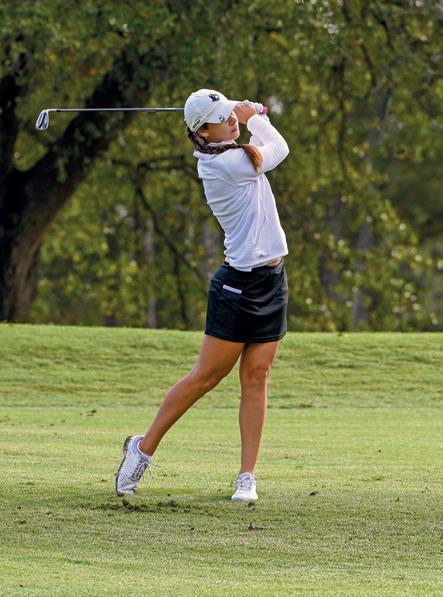
2,000 students, so I like how you know many people on campus and the smaller classes. I get on well with my coach and teammates and I really enjoy it.
Do you think your golf game has improved by playing on the US College golf circuit? Why is that? Definitely. We get to practice every day and the weather is typically a lot nicer to play in. We’re pretty much playing all year and have around eight tournaments in the year, so it prepares me well for tournaments at home in the summer.
Do you miss England and our English golf courses? What's your home course? I miss my family and friends a lot but I’m so busy with work and golf that I don’t have too much time to think about it. The American golf courses are very different from English courses, so I like them both in different ways. My home course is Bishop’s Stortford Golf Club and I’m also a member at Braintree Golf Club.
What are your hopes and aims in golf? Turn pro and make a living on the Women's golf tour? My aim is to turn professional after I’ve graduated and either get onto the American or European women’s golf tours.
Outside of golf and Psychology what do you like doing and what's your favourite hobby? Hanging out with my family and friends or going shopping.
Tell us one thing you love about the US that you don't get in the UK? There are more food options and better shops.







